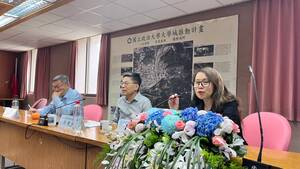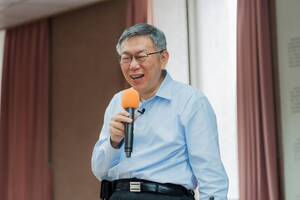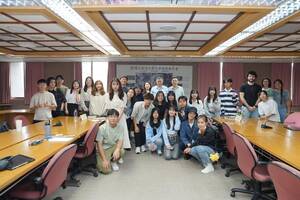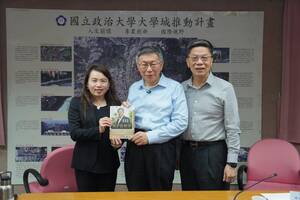Leveraging Social Media for Political Influence: Insights from Former Presidential Candidate Ko at NCCU





Date :
2024-06-14
Department :
International Master's Program in International Communication Studies
【Article by IMICS】
The International Master's Program in International Communication Studies (IMICS) at National Chengchi University (NCCU) hosted a speech on June 3rd, featuring Dr. Ko Wen-je, the current chairman of the Taiwan People’s Party (TPP). Drawing from his experience as a candidate in the 2024 presidential election, Dr. Ko provided a unique perspective on how to wield influence through social media in terms of effective political communication. The lecture, titled “Presidential Election and Political Communication,” was hosted as part of the Political Communication course, instructed by Professor Yih-Jiun Liu.
This event was structured as a dialogue between Dr. Ko and Professor Liu, with the Dean of the College of Communication, Dr. Yi-Ning Chen, serving as the moderator. Introducing Dr. Ko as a prominent and multifaceted figure while highlighting his roles as the former mayor of Taipei City and a surgeon specializing in trauma, intensive care, organ transplant, and extracorporeal membrane oxygenation (ECMO), Dr. Chen expressed her anticipation for Dr. Ko’s insightful perspectives on leveraging social media in politics.
Commencing the dialogue with a quotation from Yamamoto Isoroku, an officer in the Japanese Navy, Dr. Ko emphasized the importance of understanding both oneself and one’s opponents in achieving electoral success. “Just as Isoroku said that the simplest way to achieve success in a warfare is by counting the number of chimneys, the crucial point in a major election is to know both your winning point and possible losing point.” He further elucidated his claim by focusing on social media, which primarily engages the 20 to 30 age bracket, noting how TPP was able to shift the battlefield in its favor.
Dr. Ko identified three key factors contributing to the TPP’s performance in the recent election, where the Democratic Progressive Party (DPP) candidate, Lai Ching-te, secured approximately 40% of the vote, while both the Chinese Nationalist Party (KMT) and TPP garnered around 30%. This outcome reflects the occurrence of the 4-3-3 principle, which is commonly observed in tripartite political landscapes worldwide.
He emphasized the adverse impact of traditional media on their campaign, highlighting the “untransparent and unbalanced nature of finance behind the operation of traditional media.” Dr. Ko explained that financial dependency on business conglomerates or the government undermines the media’s role as neutral gatekeepers. Additionally, he pointed out the lack of resources within local organizations crucial for mobilization. Noting that local associations, such as village representatives and neighborhood patrol teams, can effectively mobilize people, Dr. Ko suggested that enhancing this local support by just 5% to 10% could significantly improve TPP’s position in future elections. He also stressed the need for a capable team to address these challenges, proposing that TPP should either reorganize its current structure or recruit more professionals to develop concrete solutions.
Citing the book Disruptive Innovation, Dr. Ko underscored the importance of innovation, particularly for those with limited resources, adding to the knowledge of how he leveraged social media for increasing political influence. In addition, responding to a question from Dr. Yi-Ning Chen about TPP’s media strategy, Dr. Ko mentioned how he encourages TPP members to read jokes from Reader’s Digest to enhance their public speaking and maintain audience engagement.
Dr. Ko concluded by reminding attendees that success is built on numerous failures, echoing Thomas Edison’s famous quote, “Genius is one percent inspiration and ninety-nine percent perspiration.” During the ‘Questions & Answers’ session, Dr. Ko addressed various current issues, such as the licensing of the traditional media outlet Zhong-tian and the Congressional Reform Bill, reinforcing that the currently available solutions are often not the best.
The Political Communication course is designed to enable students to explore the roles of mass media in Postmodern Democracy. Through the lens of media influence, Professor Liu aims to equip students with a comprehensive understanding of the competition among political actors over news media and the media's impact on public opinion formation. By opening this event to all faculty and students at NCCU, Professor Yih-Jiun Liu hopes that not only the students enrolled in the course can realize the agenda-setting and image-setting functions in election campaigns, but also the wider academic community can gain valuable insights into Taiwan’s major political campaigns.
The International Master's Program in International Communication Studies (IMICS) at National Chengchi University (NCCU) hosted a speech on June 3rd, featuring Dr. Ko Wen-je, the current chairman of the Taiwan People’s Party (TPP). Drawing from his experience as a candidate in the 2024 presidential election, Dr. Ko provided a unique perspective on how to wield influence through social media in terms of effective political communication. The lecture, titled “Presidential Election and Political Communication,” was hosted as part of the Political Communication course, instructed by Professor Yih-Jiun Liu.
This event was structured as a dialogue between Dr. Ko and Professor Liu, with the Dean of the College of Communication, Dr. Yi-Ning Chen, serving as the moderator. Introducing Dr. Ko as a prominent and multifaceted figure while highlighting his roles as the former mayor of Taipei City and a surgeon specializing in trauma, intensive care, organ transplant, and extracorporeal membrane oxygenation (ECMO), Dr. Chen expressed her anticipation for Dr. Ko’s insightful perspectives on leveraging social media in politics.
Commencing the dialogue with a quotation from Yamamoto Isoroku, an officer in the Japanese Navy, Dr. Ko emphasized the importance of understanding both oneself and one’s opponents in achieving electoral success. “Just as Isoroku said that the simplest way to achieve success in a warfare is by counting the number of chimneys, the crucial point in a major election is to know both your winning point and possible losing point.” He further elucidated his claim by focusing on social media, which primarily engages the 20 to 30 age bracket, noting how TPP was able to shift the battlefield in its favor.
Dr. Ko identified three key factors contributing to the TPP’s performance in the recent election, where the Democratic Progressive Party (DPP) candidate, Lai Ching-te, secured approximately 40% of the vote, while both the Chinese Nationalist Party (KMT) and TPP garnered around 30%. This outcome reflects the occurrence of the 4-3-3 principle, which is commonly observed in tripartite political landscapes worldwide.
He emphasized the adverse impact of traditional media on their campaign, highlighting the “untransparent and unbalanced nature of finance behind the operation of traditional media.” Dr. Ko explained that financial dependency on business conglomerates or the government undermines the media’s role as neutral gatekeepers. Additionally, he pointed out the lack of resources within local organizations crucial for mobilization. Noting that local associations, such as village representatives and neighborhood patrol teams, can effectively mobilize people, Dr. Ko suggested that enhancing this local support by just 5% to 10% could significantly improve TPP’s position in future elections. He also stressed the need for a capable team to address these challenges, proposing that TPP should either reorganize its current structure or recruit more professionals to develop concrete solutions.
Citing the book Disruptive Innovation, Dr. Ko underscored the importance of innovation, particularly for those with limited resources, adding to the knowledge of how he leveraged social media for increasing political influence. In addition, responding to a question from Dr. Yi-Ning Chen about TPP’s media strategy, Dr. Ko mentioned how he encourages TPP members to read jokes from Reader’s Digest to enhance their public speaking and maintain audience engagement.
Dr. Ko concluded by reminding attendees that success is built on numerous failures, echoing Thomas Edison’s famous quote, “Genius is one percent inspiration and ninety-nine percent perspiration.” During the ‘Questions & Answers’ session, Dr. Ko addressed various current issues, such as the licensing of the traditional media outlet Zhong-tian and the Congressional Reform Bill, reinforcing that the currently available solutions are often not the best.
The Political Communication course is designed to enable students to explore the roles of mass media in Postmodern Democracy. Through the lens of media influence, Professor Liu aims to equip students with a comprehensive understanding of the competition among political actors over news media and the media's impact on public opinion formation. By opening this event to all faculty and students at NCCU, Professor Yih-Jiun Liu hopes that not only the students enrolled in the course can realize the agenda-setting and image-setting functions in election campaigns, but also the wider academic community can gain valuable insights into Taiwan’s major political campaigns.


 Fax:886-2-29379611
Fax:886-2-29379611